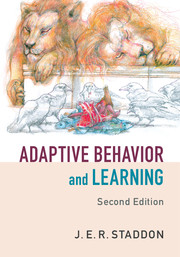Book contents
- Frontmatter
- Contents
- Preface to the second edition
- Acknowledgments
- 1 The evolution, development, and modification of behavior
- 2 Variation and selection: kineses
- 3 Reflexes
- 4 Direct orientation and feedback
- 5 Operant behavior
- 6 Reward and punishment
- 7 Feeding regulation: a model motivational system
- 8 The optimal allocation of behavior
- 9 Choice: dynamics and decision rules
- 10 Foraging and behavioral ecology
- 11 Stimulus control and cognition
- 12 Stimulus control and performance
- 13 Molar laws
- 14 Time and memory, I
- 15 Time and memory, II
- 16 Template learning
- 17 Learning, I
- 18 Models of classical conditioning
- 19 Learning, II
- 20 Learning, III: procedures
- 21 Comparative cognition
- Index
6 - Reward and punishment
Published online by Cambridge University Press: 05 March 2016
- Frontmatter
- Contents
- Preface to the second edition
- Acknowledgments
- 1 The evolution, development, and modification of behavior
- 2 Variation and selection: kineses
- 3 Reflexes
- 4 Direct orientation and feedback
- 5 Operant behavior
- 6 Reward and punishment
- 7 Feeding regulation: a model motivational system
- 8 The optimal allocation of behavior
- 9 Choice: dynamics and decision rules
- 10 Foraging and behavioral ecology
- 11 Stimulus control and cognition
- 12 Stimulus control and performance
- 13 Molar laws
- 14 Time and memory, I
- 15 Time and memory, II
- 16 Template learning
- 17 Learning, I
- 18 Models of classical conditioning
- 19 Learning, II
- 20 Learning, III: procedures
- 21 Comparative cognition
- Index
Summary
Functional explanations of behavior depend on some notion of what is good and bad. In terms of evolutionary adaptation, good and bad boil down to values of inclusive Darwinian fitness, a measure reasonably clear in principle, but hard to measure in practice. For the operant behavior of individual animals, good and bad correspond to reward and punishment, to situations better or worse than the current situation. This chapter is about reward and punishment: about the concept of reinforcement that includes them both, about how it is defined, and the procedures used to study its effects.
Two questions: (a) What makes situations good and bad? Can we define good and bad independently of the behavior of the animal: Do all good situations share common features? Or must we always see the effect of a situation on an animal before we can be sure of its hedonic value? (b) Granted that we know the hedonic properties of a situation, how does it affect behavior? What are the mechanisms, what are the rules?
Generations of moral philosophers have labored over questions of the first kind, which Aristotle termed the definition of “the good.” Cambridge moral philosopher G. E. Moore (1873–1958) summed up the modern consensus thus: “I have maintained that very many things are good and evil in themselves, and that neither class of things possesses any other property which is both common to all its members and peculiar to them.” All that good things have in common is that they are good; all that bad things have in common is that they are bad.
The early behaviorists were undeterred by philosophers’ failure to find an independent yardstick for value. Deceived by the apparent simplicity of the white rat, they tried to reduce motivated behavior to a small set of “primary drives”: Hunger, thirst, and sex were on everybody's list. For the rat, at least, the definition of a good thing was that it led to the reduction of one or more of these three drives. But when rats sometimes did things that could not be so explained, opinions differed on what was wrong. Rats in a new environment will eventually explore it, for example; given a weak electric shock for pressing a lever, they are likely to press it again rather than avoid the lever after their first press, and so on.
- Type
- Chapter
- Information
- Adaptive Behavior and Learning , pp. 135 - 174Publisher: Cambridge University PressPrint publication year: 2016



